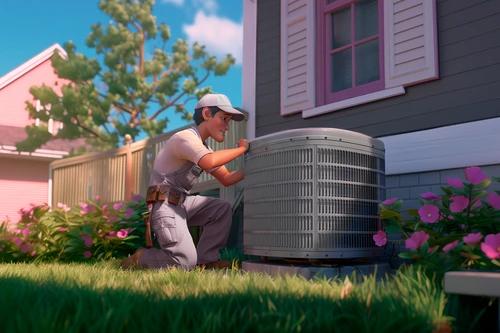How Long Do HVAC Systems Last?

If you’re wondering whether it’s time to replace your heating and cooling system, a question homeowners often ask is: How long do HVAC systems last? Much like a car, there’s no definitive lifespan for a heating and cooling system. Factors such as the make and model, maintenance history, the climate you live in, and usage can all impact an HVAC unit’s longevity.
That said, different types of systems – such as gas furnaces, central air conditioners, and heat pumps – each have an average lifespan. Understanding how long your HVAC system may last can help you decide when it might be time for an upgrade.
Factors That Affect the Lifespan of an HVAC System
Before we dive into the specifics of each HVAC system type, let’s explore some key factors that can influence their lifespan.
1. Maintenance History
Skipping maintenance occasionally might not cause problems immediately, but neglecting it altogether will eventually lead to issues over time that can shorten your system’s life. Ideally, HVAC tune-ups should be performed twice a year – once before the heating season and again before cooling season.
During HVAC maintenance, a technician will inspect the unit, identify minor issues, and recommend needed repairs before they lead to more serious and expensive issues down the road. Regular tune-ups also include cleaning essential components such as the evaporator and condenser coil (if applicable), tightening electrical connections, and calibrating the thermostat.
2. Installation Quality
An improperly installed HVAC system can cause issues like electrical problems, poor drainage, bad venting, or misalignment, which can cause unnecessary wear and tear and premature replacement. Look for a reputable company with strong online reviews, or contact HVAC.com to connect you with a top-rated installer in your area.
3. Local Climate
Where you live also plays a significant role in how long your HVAC system may last. For example, furnaces in colder regions – such as the northern U.S. – tend to wear out faster due to long, harsh winters. Meanwhile, air conditioners in humid or coastal areas with salty air may have shorter lifespans because salt can corrode and damage outdoor components, leading to breakdowns and faster deterioration.
4. Usage Patterns
If you like your home cool and crisp in the summer and warm and toasty during the winter, your HVAC system will be under more strain to keep up. To extend the lifespan of your unit, try setting your thermostat to more energy-efficient levels to reduce energy bills and decrease wear and tear.
5. Incorrectly Sized System
Size matters when it comes to HVAC systems. An HVAC system that’s either too small or too large for your home can lead to inefficiency, higher energy costs, and premature wear. A system that’s too small will run constantly and overwork its components, while one that’s too large will cycle on and off too frequently.
6. Make and Model
The brand and quality of your HVAC system can play a role in its lifespan. While a high-quality unit from a reputable manufacturer may cost more upfront, it’s likely to be more durable and reliable in the long run. Meanwhile, budget brands tend to experience increased wear and tear and may require more frequent repairs, ultimately shortening the system’s lifespan.
How Long Do Various HVAC Systems Last?
Central Air Conditioners
Central air conditioners can last between 15-20 years with regular maintenance. In warmer climates with year-round heat, like Florida or Arizona, the lifespan may be closer to 10 years.
Air-Source Heat Pumps
Heat pumps typically don’t last quite as long as central air conditioners given they work year-round providing homes with both heating and cooling. On average, air-source heat pumps last 10-15 years. Factors such as maintenance, usage patterns, and installation quality all affect how long a heat pump lasts.
Geothermal Heat Pumps
Geothermal heat pumps are among the most efficient and longest-lasting systems available. Although they are expensive to install, the heat pump itself can last more than 20 years, and the ground loop, which exchanges heat between the ground and your home, can last 25-50 years or more with regular maintenance.
Ductless Mini-Splits
Ductless mini-split systems generally last between 15-20 years. Their longevity is influenced by factors such as regular maintenance, proper installation, usage patterns, and keeping the outdoor unit free of debris and obstructions.
Boilers
Gas boilers, though less common than furnaces, are still widely used for heating especially in the Northeast. Typically, boilers last about 15-20 years, though some well-maintained units can continue running efficiently for 30 years or more. The type of boiler, maintenance, and proper sizing are the primary factors that influence its longevity.
Gas Furnaces
Gas furnaces are the most common type of heating system in the U.S. and generally last 15-20 years. However, if you live in a colder climate where the furnace is used more frequently, it may need to be replaced sooner. Ensure to invest in regular maintenance to keep your gas furnace running efficiently.
Electric Furnaces
Electric furnaces are often found in milder climates and are typically less expensive to buy and maintain than gas models. While they aren’t as energy efficient, they can last between 20-30 years with proper care.
